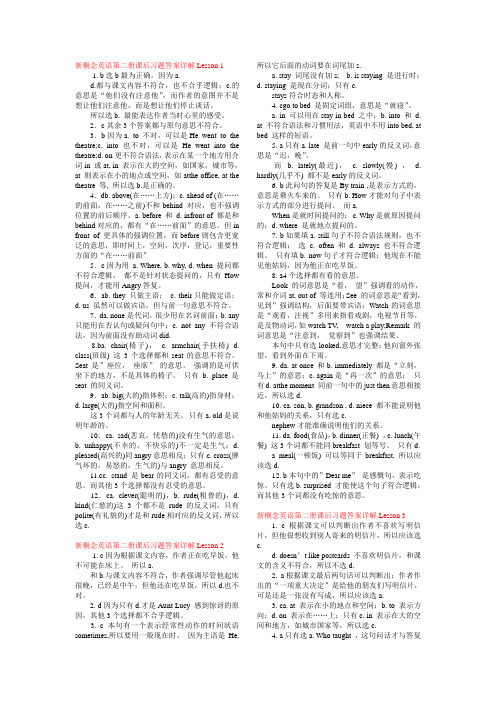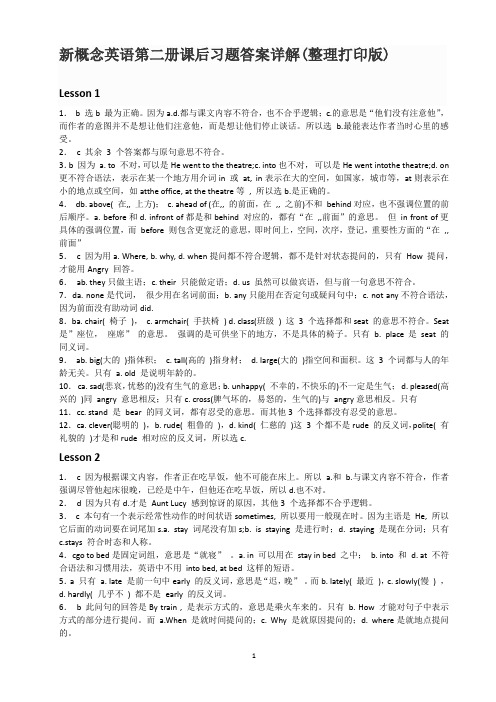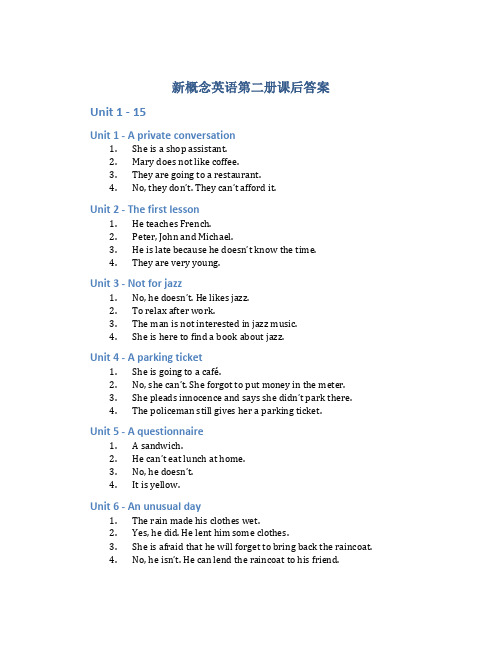新概念英语第二册课后练习答案
新概念英语第二册课后习题答案详解-and-单元测试答案(全)

新概念英语第二册课后习题答案详解Lesson 11. b选b最为正确。
因为a.d.都与课文内容不符合,也不合乎逻辑;c.的意思是“他们没有注意他”,而作者的意图并不是想让他们注意他,而是想让他们停止谈话。
所以选b. 最能表达作者当时心里的感受。
2.c其余3个答案都与原句意思不符合。
3.b因为a. to 不对,可以是He went to the theatre;c. into 也不对,可以是He went into the theatre;d. on更不符合语法,表示在某一个地方用介词in 或at, in 表示在大的空间,如国家,城市等,at 则表示在小的地点或空间,如atthe office, at the theatre 等, 所以选b.是正确的。
4.db. above(在……上方);c. ahead of (在……的前面,在……之前)不和behind 对应,也不强调位置的前后顺序。
a. before 和d. infront of 都是和behind对应的,都有“在……前面”的意思。
但in front of 更具体的强调位置,而before则包含更宽泛的意思,即时间上,空间,次序,登记,重要性方面的“在……前面”5.c因为用 a. Where, b. why, d. when 提问都不符合逻辑,都不是针对状态提问的,只有How 提问,才能用Angry答复。
6.ab. they 只做主语; c. their只能做定语;d. us 虽然可以做宾语,但与前一句意思不符合。
7.da. none是代词,很少用在名词前面;b. any 只能用在否认句或疑问句中;c. not any 不符合语法,因为前面没有助动词did.8.ba. chair(椅子), c. armchair(手扶椅) d. class(班级) 这3个选择都和seat的意思不符合。
Seat是”座位,座席”的意思。
强调的是可供坐下的地方,不是具体的椅子。
新概念英语第二册课后习题答案详解(整理打印版)

新概念英语第二册课后习题答案详解(整理打印版)Lesson 11.b 选b 最为正确。
因为a.d.都与课文内容不符合,也不合乎逻辑;c.的意思是“他们没有注意他”,而作者的意图并不是想让他们注意他,而是想让他们停止谈话。
所以选 b.最能表达作者当时心里的感受。
2.c 其余3 个答案都与原句意思不符合。
3.b 因为a. to 不对,可以是He went to the theatre;c. into也不对,可以是He went intothe theatre;d. on 更不符合语法,表示在某一个地方用介词in 或at, in表示在大的空间,如国家,城市等,at则表示在小的地点或空间,如atthe office, at the theatre等, 所以选b.是正确的。
4.db. above( 在,, 上方);c. ahead of (在,, 的前面,在,, 之前)不和behind对应,也不强调位置的前后顺序。
a. before和d. infront of都是和behind 对应的,都有“在,,前面”的意思。
但in front of更具体的强调位置,而before 则包含更宽泛的意思,即时间上,空间,次序,登记,重要性方面的“在,, 前面”5.c 因为用a. Where, b. why, d. when提问都不符合逻辑,都不是针对状态提问的,只有How 提问,才能用Angry 回答。
6.ab. they只做主语;c. their 只能做定语;d. us 虽然可以做宾语,但与前一句意思不符合。
7.da. none是代词,很少用在名词前面;b. any只能用在否定句或疑问句中;c. not any不符合语法,因为前面没有助动词did.8.ba. chair( 椅子),c. armchair( 手扶椅) d. class(班级) 这3 个选择都和seat 的意思不符合。
Seat 是”座位,座席”的意思。
强调的是可供坐下的地方,不是具体的椅子。
新概念英语第二册课后习题答案详解

新概念英语第二册课后习题答案详解-1-40(总45页)--本页仅作为文档封面,使用时请直接删除即可----内页可以根据需求调整合适字体及大小--新概念英语第二册课后习题答案详解Lesson 11. b选b最为正确。
因为a.d.都与课文内容不符合,也不合乎逻辑;c.的意思是“他们没有注意他”,而作者的意图并不是想让他们注意他,而是想让他们停止谈话。
所以选b. 最能表达作者当时心里的感受。
2.c其余3个答案都与原句意思不符合。
3.b因为a. to 不对,可以是He went to the theatre;c. into 也不对,可以是He went into the theatre;d. on更不符合语法,表示在某一个地方用介词in 或at, in 表示在大的空间,如国家,城市等,at 则表示在小的地点或空间,如atthe office, at the theatre 等, 所以选b.是正确的。
4.db. above(在……上方);c. ahead of (在……的前面,在……之前)不和behind 对应,也不强调位置的前后顺序。
a. before 和 d. infront of 都是和behind对应的,都有“在……前面”的意思。
但in front of 更具体的强调位置,而before则包含更宽泛的意思,即时间上,空间,次序,登记,重要性方面的“在……前面”5.c因为用 a. Where, b. why, d. when 提问都不符合逻辑,都不是针对状态提问的,只有How提问,才能用Angry回答。
6.ab. they 只做主语; c. their只能做定语;d. us 虽然可以做宾语,但与前一句意思不符合。
7.da. none是代词,很少用在名词前面;b. any 只能用在否定句或疑问句中;c. not any 不符合语法,因为前面没有助动词did.. chair(椅子), c. armchair(手扶椅) d. class(班级) 这3个选择都和seat的意思不符合。
新概念英语第二册答案(全)

Lesson 3: cacac bccba bb Lesson 4: dbabb acbca cc Lesson 5: cadbc dabcb bd Lesson 6: dacdd adaba da Lesson 7: bccda cdacb ab Lesson 8: dbbac cbbad bb Lesson 9: cbdaa bbdbb dc Lesson 10: addcb cacac ca Lesson 11: bbbab ccacc bd Lesson 12: ccadd adacd aa Lesson : 13 bdbca bbcaa ad Lesson 14: bcacd bcbcb bb Lesson 15: dbcbc dadcc cb Lesson 16: aadab adadd da Lesson 17: dbbdc cbaac ad Lesson18 : Bdbdb cdcac cb Lesson 19: Adccd bcbca cc Lesson 20: Bcbbc bcacc da Lesson 21 : cdcda cbbad cc Lesson 22: dbddb dacda bb Lesson 23: aaacc addbb ad Lesson 24: baaca acccb ab Lesson 25: cbbab cdbaa da Lesson 26: adcbc ddabd bd Lesson 27: dcddd baddc cc Lesson 28: cdbbc dbdcd ba Lesson 29: bccbd babbb cb Lesson 30: aadab cccda dd Lesson 31: dbaca adabc ac Lesson 32: cccbb cadad bc Lesson 33: dbdac bbccc ac Lesson 34: dabca dcbcb ca Lesson 35: adadd adaba dd Lesson 36: addcd ccbad cc Lesson 37: cbbbb dacdb ba Lesson 38: bcaac bddba dd Lesson 39: dacdd abacc ab Lesson 40: ccbca acbbb bd Lesson 41: aacdc bbada cb Lesson 42: dddbb cddac da Lesson 43: bbaad daccd ac Lesson 44: cbccc bdaba bdLesson 47: dabad aaddc ac Lesson 48: cbcba cbbda bc Lesson 49: dabab ccacc aa Lesson 50: dbacc aadbb cd Lesson 51: bcddd adcad db Lesson 52: bccab dcbac bd Lesson 53: cdacc cdcda cc Lesson 54: dbdbd badcb dd Lesson 55: aabda acabd ab Lesson 56: cacca cabbc cc Lesson 57: abbbb dcdcb da Lesson 58: bdaac bdcad bd Lesson 59: dbddd abada ab Lesson 60: bacbc babac ad Lesson 61: bacca dcabb dd Lesson 62: addcd ccbda db Lesson 63: dbaab ddacd ca Lesson 64: ccccb bccab bb Lesson 65: adbbc aadcc bd Lesson 66: cbaad aabab ba Lesson 67: daddd dbbad dd Lesson 68: bbcdb bbccc aa Lesson 69: abcbb ddaab cd Lesson 70: dbccd bcacd dc Lesson 71: bdbbc cdbbc ba Lesson 72: acadb accdb ad Lesson 73: cadac dadaa db Lesson 74: baccd cacbc ab Lesson 75: cabdb abbdd cc Lesson 76: dbdaa bbacb dd Lesson 77: acabc dddaa ba Lesson 78: acbbc acbab ca Lesson 79: bdcca dbada ac Lesson 80: cbdad cadcc db Lesson 81: daadb bdcbd bd Lesson 82: abadc cdaac bd Lesson 83: bacca bcbcd ab Lesson 84: ccabd cccda cd Lesson 85: ddbab abdbb dc Lesson 86: bcabb bdcab bc Lesson 87: cdcda ccada ad Lesson 88: cbbcc abbcc cbLesson 91: dbcbc dbbcb cb Lesson 92: bcdcb abbad ca Lesson 93: cdbac ccdcb db Lesson 94: abcba dacda bc Lesson 95: dabad cdcac dc Lesson 96: dccba dcdab cb。
新概念英语第二册课后答案

新概念英语第二册课后答案Unit 1 - 15Unit 1 - A private conversation1.She is a shop assistant.2.Mary does not like coffee.3.They are going to a restaurant.4.No, they don’t. They can’t afford it.Unit 2 - The first lesson1.He teaches French.2.Peter, John and Michael.3.He is late because he doesn’t know the time.4.They are very young.Unit 3 - Not for jazz1.No, he doesn’t. He likes jazz.2.To relax after work.3.The man is not interested in jazz music.4.She is here to find a book about jazz.Unit 4 - A parking ticket1.She is going to a café.2.No, she can’t. She forgot to put money in the meter.3.She pleads innocence and says she didn’t park there.4.The policeman still gives her a parking ticket.Unit 5 - A questionnaire1. A sandwich.2.He can’t eat lunch at home.3.No, he doesn’t.4.It is yellow.Unit 6 - An unusual day1.The rain made his clothes wet.2.Yes, he did. He lent him some clothes.3.She is afraid that he will forget to bring back the raincoat.4.No, he isn’t. He can lend the raincoat to his friend.Unit 7 - Is that you, John?1.He d oesn’t think it is John’s voice.2.He has lost his wallet on the train.3.No, he didn’t. He found £20.4.He should return the money.Unit 8 - A coffee break1.No, she doesn’t drink coffee.2.She wants to buy some milk.3.No, he doesn’t. He is going to buy some lemon t ea.4.The tea costs £1.80.Unit 9 - A matter of seconds1.In a library.2.She asked the man to return the book to the library.3.No, she doesn’t have enough money to pay the fine.4.She gets a letter from the library.Unit 10 - When were you born?1.He was born on May 5th, 1965.2.His father was born in 1935.3.Yes, he does. He is a schoolteacher.4.He is very tired.Unit 11 - The best and the worst1.In Rome and Paris.2.Rome was the most interesting place he visited.3.The weather in India was the worst.4.He doesn’t know. He hasn’t been to Switzerland. Unit 12 - New Zealand1.It is a small country in the South Pacific.2.There are three main islands.3.The capital city is Wellington.4.The people there are friendly.Unit 13 - Work and play1.He is a teacher.2.Teacher to students.3.He can’t stay with his friends because he has to work.4.He can’t. He has work to do.Unit 14 - A museum for everyone1.Yes, it does.2.They can touch everything in the museum.3.Yes, they have. They enjoyed their visit very much.4.They don’t have to pay any money.Unit 15 - Paying the bill1.They had lunch at a restaurant.2.They pay first and then have lunch.3.They forget to bring any money.4.They invite the man to have some coffee.ConclusionThe above answers are provided for the exercises in the New Concept English Book 2. Go through the questions and compare your answers with the suggested responses to check for correctness. Practicing and reviewing these exercises will help enhance your understanding of the course material and improve your English language skills.。
新概念英语第二册课后习题答案全

新概念英语第二册课后习题答案全一、练习册第1课至第10课课后习题答案1. Lesson 1: A Private ConversationAnswer Key:1. Yes, he did.2. He asked the woman to change her seat.3. She replied that she was in the middle.2. Lesson 2: Breakfast or Lunch?Answer Key:1. He wanted to buy a newspaper.2. He ordered breakfast.3. He thought it was too early for lunch.3. Lesson 3: Please Send Me a CardAnswer Key:1. He was in a small village.2. He sent a telegram to his wife.3. He was in a hospital.4. Lesson 4: An Exciting TripAnswer Key:1. They were in a bus.2. They were going to a village.3. They had a wonderful trip.5. Lesson 5: No Wrong Numbers1. He was waiting for a phone call.2. He was waiting for his uncle.3. He received a wrong number.6. Lesson 6: Percy ButtonsAnswer Key:1. He was an old man.2. He collected old coins.3. He had a valuable coin.7. Lesson 7: Too LateAnswer Key:1. They were late for the meeting.2. They missed the train.3. They had to take a taxi.8. Lesson 8: The Best and the WorstAnswer Key:1. He was a good swimmer.2. He was the best swimmer in the pool.3. He was the worst swimmer in the pool. Answer Key:1. He was a famous actor.2. He was in a small town.3. He was recognized a young man.10. Lesson 10: Not for Jazz1. He was a famous musician.2. He played the piano.3. He was not for jazz.二、练习册第11课至第20课课后习题答案11. Lesson 11: One Good Turn Deserves Another Answer Key:1. He helped an old lady.2. She helped him find his way.3. He was grateful to her.12. Lesson 12: Ask Me No QuestionsAnswer Key:1. He was a writer.2. He wrote a book about his adventures.3. He was very modest.13. Lesson 13: Going on HolidayAnswer Key:1. They were going on holiday.2. They were going to the seaside.3. They had a wonderful time.14. Lesson 14: Do You Speak English?Answer Key:1. He was a tourist.2. He was in a foreign country.3. He spoke English.15. Lesson 15: Good NewsAnswer Key:1. He was a doctor.2. He had good news for his patient.3. The patient was cured.16. Lesson 16: A Polite RequestAnswer Key:1. He was a customer.2. He wanted to buy a new car.3. He asked the salesman for help.17. Lesson 17: Across the ChannelAnswer Key:1. He was a swimmer.2. He swam across the English Channel.3. He was very tired.18. Lesson 18: Once a WeekAnswer Key:1. He was a doctor.2. He visited his patients once a week.3. He was very busy.19. Lesson 19: Sold OutAnswer Key:1. He was a customer.2. He wanted to buy a ticket.3. The ticket was sold out.20. Lesson 20: One Man in a BoatAnswer Key:1. He was a fisherman.2. He was alone in a boat.3. He caught a lot of fish.。
新概念英语第二册课后习题答案详解(96课全)

新概念英语第二册课后习题答案详解Lesson 31. c根据课文可以判断出作者不喜欢写明信片,但他很想收到别人寄来的明信片,所以应该选c.d. doesn’t like postcards 不喜欢明信片,和课文的含义不符合,所以不选d.2. a根据课文最后两句话可以判断出:作者作出的“一项重大决定”是给他的朋友们写明信片,可是还是一张没有写成,所以应该选a.3. ca. at 表示在小的地点和空间;b. to 表示方向;d. on 表示在……上;只有c. in 表示在大的空间和地方,如城市国家等,所以选c.4. a只有选a. Who taught ,这句问话才与回答相配。
5. d只有选d. in a friendly way(以友好的方式)才能说明前一句He was a friendly waiter,也合乎语法和逻辑。
而其他3个 a. friend(朋友), b. as friends(作为朋友),c. like friends(像朋友一样)在语法上都讲不通。
6. b本句的时态是一般过去时,应该用动词的过去式形式;a. reads 是第3人称蛋单数现在时形式;c. red 词意思不符合;d. reading 是现在分词形式;b. read 过去式和现在式形式相同,发音不同。
所以只有选b.7. ca. the hole 词意思不对;b. the ball 和 d. all of 不合乎习惯用法;英语中不用the all day, all of day 这样一来的短语。
只有选c. all 才能使句中的词组all day 同前一句中的the whole day 意思相同。
8. c句中的waiter 是“饭店服务员”的意思,他通常在饭店工作,而不在a. public garden(公园),b. shop(商店),d. private house(私宅) 工作,所以选c. restaurant.9. b只有b. borrowed 才与前一句中的lent相对应,而其他3个选择都不是。
新概念第二册练习册答案

新概念第二册练习册答案新概念英语第二册是一套广受欢迎的英语教材,它通过各种练习帮助学生提高英语水平。
以下是一些新概念第二册练习册的示例答案,供参考。
Lesson 1: A Private ConversationExercise 1: Fill in the blanks with the correct form of the verbs in parentheses.1. The man was reading a book. (read)2. The woman sat down quickly. (sit)3. I listened to the conversation. (listen)4. They talked about their holiday plans. (talk)5. He wanted to go to Spain. (want)Exercise 2: Answer the following questions.1. What was the man doing when the woman sat down next to him? - The man was reading a book.2. What did the woman do when she sat down?- She didn't do anything; she just sat down.3. What did the man and woman talk about?- They talked about their holiday plans.Lesson 2: Breakfast or Lunch?Exercise 1: Rewrite the sentences in the past simple tense.1. She usually has breakfast at seven o'clock.- She had breakfast at seven o'clock.2. He is going to have lunch at half past twelve.- He was going to have lunch at half past twelve.Exercise 2: Complete the dialogue with the correct form of the verbs.- A: What's the time?- B: It's eight o'clock. Why are you getting up now? You always get up at a quarter past six.- A: I usually get up early, but I slept until late this morning.Lesson 3: Please Send Me a CardExercise 1: Change the sentences into the negative form.1. They send me a card every year.- They don't send me a card every year.2. I visit them sometimes.- I don't visit them sometimes.Exercise 2: Write 'true' or 'false' to indicate whether the statements are correct.1. The writer usually receives a card from his aunt.- True2. The writer's aunt lives abroad.- False结束语:希望这些示例答案能够帮助你更好地理解新概念第二册的练习内容。
- 1、下载文档前请自行甄别文档内容的完整性,平台不提供额外的编辑、内容补充、找答案等附加服务。
- 2、"仅部分预览"的文档,不可在线预览部分如存在完整性等问题,可反馈申请退款(可完整预览的文档不适用该条件!)。
- 3、如文档侵犯您的权益,请联系客服反馈,我们会尽快为您处理(人工客服工作时间:9:00-18:30)。
新概念英语第二册课后习题答案详解Lesson 16
练习答案 Key to written exercises
1.关键句型练习答案
A The word if has been used four times.
C 1 rains 2 will never pass 3 is 4will get 5 enjoys 6 is D…if I listen to the radio…If I do something wrong, don't shout at me. If the house is untidy, don't blame me. If you want me to do something, don't forget to say‘please’. If I am playing a nice game, don't send me to bed. If I ask for something…If it is cold don't put the cat out…
2.难点练习答案
1 pay attention
2 remind
3 are knocking
4 look after
5 Remember me
3.多项选择题答案
1. a根据课文3-4行Traffic police are sometimes very polite.只有 a. occasionallyvery polite 同这句话意思接近,所以选a.
2. a根据课文第4-5行During a holiday in Sweden, I found this note on my car,只有a. parked his car in the wrong place and received a polite notefrom the police 与课文实际内容相符合,而其它3个都与课文内容不符合.
3. d以if引导的条件句是现在时,主句应该用将来时will.
a. will 时态正确,但不符合题目意思,应该用否定形式;
b. wouldn't,
c. didn't 都不符合时态要求;只有
d. won't 符合时态要求和题目意思。
4. a选a是因为动词let做谓语的时候后面只能跟不带to的动词不定式。
其他3个选择都不符合语法。
5. b本句是前一句We welcome you to our city 的另一种表达方式。
只有选 b. arewelcome才能使这个句子同前一句意思相同。
welcome既可以做动词,也可以做形容词。
做动词是“欢迎”的意思,它后面一定要有宾语,做形容词,常做表语意思是“受欢迎的”
6. aNo parking 是“禁止停车”的意思,只有a. Don't leave your car here 同它意思接近。
其他3个选择意思都不够贴切。
b. without parking 没有停车
c. don't stop 别停下来
d. There's no room to park her
e. 这里没有停车的地方了。
显然跟“禁止停车”意思相差悬殊。
7. d为了说明前一句This note is only a reminder(这张字条只是一个提醒.)的强调语气词only只是,仅仅是.只有选d. nothing more 意思最接近,其他3个选择意思都不对.
a. nothing 什么也没有
b. no one 没人
c. nothing extra 没有多余的
d. nothing more 只是, 再没有了.
8. a只有 a. district(区)与此同时前一句的area(地区)意思最接近. 而 b. country(国家,乡村),c.
surrounding(周围环境),d. kingdom(王国)这3个都同area意思不同.
9. d本句需要对前一句you will enjoy your stay(你会过得很快乐)作进一步解释。
只有选d. It will please you(它会使你快乐)才同前一句的意思一致。
注意:enjoy 是“享受……乐趣”,“喜欢,喜爱”的意思,它的主语一般是人。
sb. enjoys sth.表示“某人喜欢某物”。
please是“使高兴,使喜欢”的意思,它的主语通常是物(但也可以是人)。
sth. please sb.
表示“某物使某人高兴”,这句话主语变成了it ,所以选d. please 词意思是最准确的。
而a. amuse(使欢乐,使娱乐或消遣)意思不够准确;b. enjoy 不能用it作主语;c. laugh at (嘲笑)词意思不对;10. d本句是要说明前一句的stay(停留,逗留时间)的,只有选d. remain(停留,呆在某地)才能使这个句子的意思与前一句相符。
11. d前一句的reminder 是"提示,提醒"的意思,只有选D. you to remember才能解释reminder的含义.而其它的三个选择a. you remind(使...想起), b yoursouvenir(你的纪念品), c. your remembrance(你的记忆/回忆)既不符合题意思,也不符合语法.
12. ab. deny(否认,否定); c. resist(抵抗,反抗); d. withdraw(收回),这三个都不符合题意思.只有 a.
refuse(拒绝),最符合题的意思,与前一句 You cannot fail to obey it(你不能不服从它)的意思一致.。
